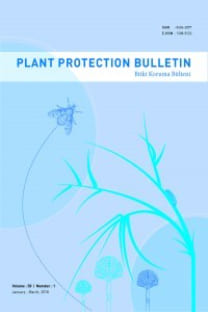AYÇİÇEĞİ MİLDİYÖSÜ (Plasmopara halstedii(Farlow)Berl. et de Toni)'NÜN YAPAY İNOKULASYONU,BUNUN DEĞERLENDİRİLMESİ, İNOKULASYODAN SONRAKİ SICAKLIĞIN HASTALIK ÇIKIŞINA ETKİSİ VE KİMYASAL SAVAŞIM
Ayçiçeği mildiyösünde yapay inokulasyon ite sistemik enfeksiyon tohumlar 3 gün çimlendirildikten sonra mildiyö sporangium süspansiyonunda 18°C,de 3 saat 30 dakika tutularak başarılı şekilde elde edilmiştir.İnokulasyonun değerlendirilmesinde kotiledon testi,ileri devrede bitki kontrolü ile aynı sonucu vermiştir.Yapay inokulasyondan sonra çimlenmiş bitkiler 30-32 C sıcaklıkta tutul - duklarında. hastalık çıkışı süre ile ters orantılı olarak azalmıştır. Mildiyö, Ridomil 25 W.P ilacı ile gerek tohum ilaçlaması(300g/- İ00 kg tohum)gerekse yaprak ilaçlaması (200 g/100 lt.su)ile başa - rılı şekilde önlenmiştir.
ARTIFICIAL INOCULATIONS OF SUNFLOWER DOWY MILDEW (PLASMOPARA HALSTEDII) ITS EVALUATION EFFECT OF HIGH TEMPERATURE (30-32°C) ON DISEASE INCIDENCE AND ITS CHEMICAL CONTROL WITH RlDOMlL
Detection of infections,achieved by artifical inoculajbipnsjj by placing the cotyledones in a humid chamber and observing mildew sporangiophores and sporangia gave the same percentage of disease incidence as tracing the infection on the grown plants. Keeping the artificially inoculated seedlings by whole seedling inoculation tecnique on high temperatures (30-32°C)reduced the disease incidence as the exposure time increased.SunfloWer mildew was controlled completely by Ridomil both as dry seed treat - ment (300 g/100 kg seed) and foliar spray (200 g/100 İt water).
Keywords:
INOOJLATIONS, PLASMOPARA SUNFLOWER,
- ISSN: 0406-3597
- Yayın Aralığı: Yılda 4 Sayı
- Başlangıç: 1952
- Yayıncı: Zirai Mücadele Merkez Araştırma Enstitüsü Müdürlüğü
Sayıdaki Diğer Makaleler
